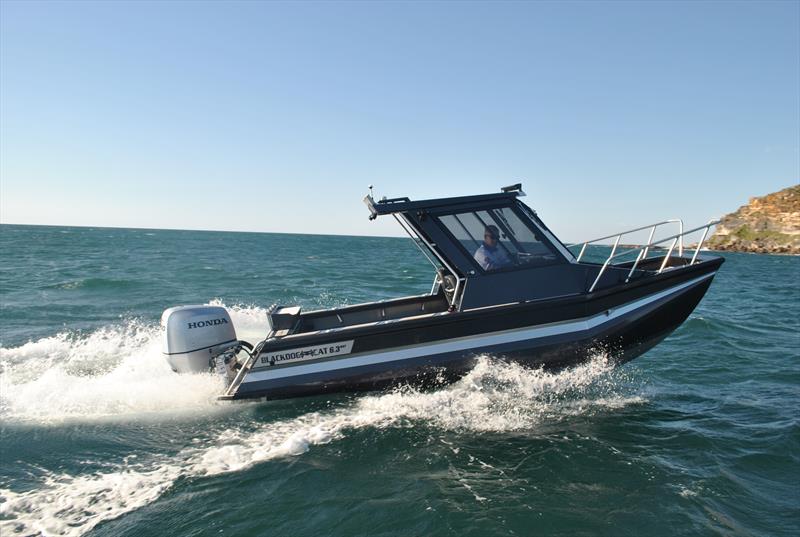
Auckland regional fuel tax sees boats taxed to fund roads
by Isla McKechnie 29 Sep 2018 11:20 NZST
29 September 2018

Northland boatbuilders Blackdog Cat travel to the Auckland On Water Boat Show to sell their vessels to the keen boating public © Auckland on the Water Boat Show
The twentieth edition of the Auckland On Water Boat Show kicked off today, and with show-goers lining up to enter as the gates opened at 10, the NZ Marine industry highlights the importance of not letting the regional fuel tax dampen the NZ marine industry.
Confidence is buoyant within the New Zealand marine industry as the America’s Cup approaches but with Auckland’s regional fuel tax seeing boats taxed for non-marine related infrastructure, the NZ Marine Industry points out the consequences could be wide-reaching for New Zealand businesses. Between central government and the Auckland regional fuel tax, Aucklanders are paying $108,000,000 in fuel tax
The NZ Marine Industry Association and Coastguard New Zealand are urging the Government to take a closer look at the Auckland regional fuel tax which will hit Auckland-based boat owners twice - once when they fill up their cars, and again when they fill up their boats.
The change sees boaties paying more for their recreation on the water in order to fund our roads and NZ Marine executive director Peter Busfield, says the consequences go beyond introducing a barrier to recreational boating.
"While it’s clearly unfair to tax a recreational group to pay for another sector’s infrastructure, the effects will be felt far more widely than solely in boaters’ wallets. The Auckland recreational boating industry contributes significantly, providing jobs and apprentice training,” says Busfield.
The tax will put an extra burden on boaters without any mitigating factors which could justify it, such as some of the funds being pushed back into marine environmental projects, boating safety or extra marine facilities. Nationwide, more people than ever are going boating but many regions have a limited number of boat ramps complete with car and trailer parking.
If councils wish to encourage quality family time on the waterways, then they will need to address the current shortage of boat ramps nationwide. According to a recent Maritime NZ report on recreational boating, approximately 1,515,864 adults in New Zealand are involved in recreational boating; 37 per cent of those are Aucklanders, with further boaties travelling to the city from other regions for their on-water activities. More people per capita go boating in Auckland than in any other region.
That means approximately 219,000 people are affected by the regional fuel tax as applied to boaties in Auckland.
NZ Marine estimates those Auckland recreational boat users mostly with trailer power boats are paying regional petrol fuel tax of $5,864,0400, while diesel launch and keel boats are being charged $1,092,500. Users across the categories include powerboats, launches, keel yachts with engines, jet skis, RIBS and dinghies and 64 per cent of them share their boating time with family and friends.
While commercial vessels can apply for a rebate, recreational users cannot, leaving the association concerned with the effect on the marine industry New Zealand-wide. NZ Marine says the extra tax may be the tipping point which dampens new boat sales and the industries they support by making boating less affordable for the consumer - particularly in the smaller boat range.
“Getting out on the water is a national pastime,” says Busfield. “We believe it’s not in the best interests of Kiwi families to make time spent in the family dinghy; or weekends heading out in a RIB to go fishing, an unaffordable hobby.”
For example, as of July 2018 there were 180,000 trailer power boats in use, representing a significant sector of business for trailer manufacturers, boat builders and supporting industries who supply, service and re-sell them.
“Many of our member companies across the country build and service boats bound for Auckland; with a large number of them dealing with the smaller vessels that make recreational boating in New Zealand so accessible to people from all walks of life.
“We, as an industry, strongly feel this disincentive to boaters in Auckland will have harmful and wide-reaching consequences for our member companies,” says Busfield.